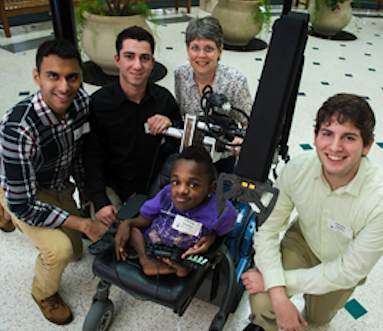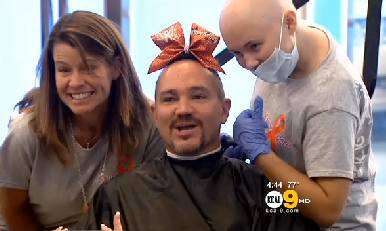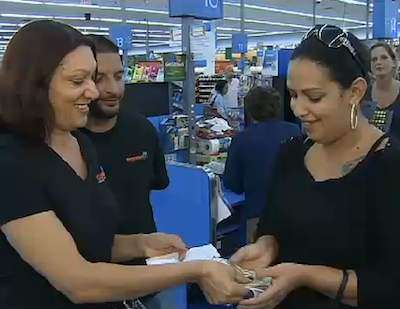It was a big day for Dee Faught when a team of Rice University students gave him a helping hand. In fact, they gave him a whole arm.
The bioengineering students won Rice's George R. Brown School of Engineering Design Competition last April for their R-ARM, a robotic device for Faught that fits on his motorized chair and uses a video game controller for manipulating the movements. The eager teen finally tried out the robotic arm two months ago when students had finished their main work on the project after two years of labor. (See the video bleow)
The arm allows Faught, who lives with osteogenesis imperfecta, a genetic condition that makes his bones especially brittle, to perform tasks most people take for granted.
"It will help him reach into the cabinets and get a cup," said his mom, Stacy Faught, who added, "One of the things I'm excited about is that he'll be able to pick up his laundry off the floor."
Members of Team Brittle Bones — Rice juniors Matthew Nojoomi, Nimish Mittal and Sergio Gonzalez – designed the robotic arm after Faught's doctor, Gloria Gogola, had suggested that some students consider designing a device to help her patient.
"I expected a high level of engineering talent," said Gogola, an orthopedic surgeon at Shriners Hospital for Children in Houston who has advised several design teams at Rice. "But I was astounded at the amount of sensitivity they had toward Dee. It gives me hope that there are young engineers out there who are so sensitive to people with special needs who are fantastic in their own right."
The students, who did the bulk of their work at Rice's Oshman Engineering Design Kitchen, hope to commercialize the product, which they see themselves working on even after graduation. They are applying for grants to further develop R-ARM and hope to work with advisers at Rice's Jones Graduate School of Business to devise a business plan.
Gonzalez said he is aware of commercial robotic arms that cost upward of $25,000. The students made theirs for $800 and the cost could come down even further.
"We'll set up a repair manual for his parents and for students at Rice so that even when we're gone, they can bring the arm back and fix it up," Gonzalez said.
"Not many kids I know get to have a robotic arm," said Faught, who lives with his parents and siblings in Friendswood, Texas, and plans to attend Houston Community College for the next two years and then transfer to a school in New York to pursue a career in music.
"He's an incredible kid," Mittal said. "I think that's part of the reason we stuck with it. If it was just an abstract kind of project, we would have been less motivated. But the fact that we were building it for Dee drove us. We didn't want to disappoint him."
(WATCH the video below)










Be the first to comment